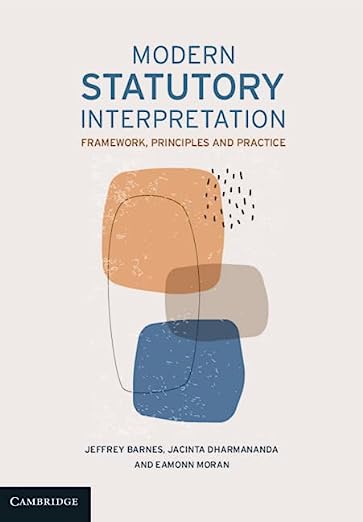Modern statutory interpretation
framework, principles and practice
- ISBN: 9781108816021
- Editorial: Cambridge University Press
- Fecha de la edición: 2023
- Lugar de la edición: Cambridge. Reino Unido
- Encuadernación: Rústica
- Medidas: 24 cm
- Nº Pág.: 726
- Idiomas: Inglés

Statutory interpretation is both a distinct body of law governing the determination of the meaning of legislation and a task that requires a set of skills. It is thus an essential area of legal practice, education and research. Modern Statutory Interpretation: Framework, Principles and Practice is an original, clear, coherent and research-based account of contemporary Australian statutory interpretation. Written by experts in the field, the book provides a comprehensive coverage of statutory interpretation law as well as examining related areas such as legislative drafting, the parliamentary process, the modern history of interpretation, sources of doubt, and interpretation techniques. The content is structured in eight parts. Parts I-III introduce foundational matters, Parts IV-VII deal with the general principles of interpretation, and Part VIII examines special interpretative issues. Modern Statutory Interpretation is an essential resource for legal professionals, legal researchers, and students undertaking advanced courses in statutory interpretation in Australia
Part I. Background; 1. The nature of statutory interpretation; 2. A modern history of key concepts; 3. Constitutional context; Part II. The Framework of Statutory Interpretation: 4. Legislative intent; 5. The judicial duty to be independent; 6. Text-based interpretation; 7. Context; 8. Purpose; 9. Practical techniques; Part III. Working with Legislation: Broader Skills and Knowledge: 10. Legislative drafting; 11. Enactment procedure; 12. Commencement; 13. Structure and components of an Act; 14. Problem analysis: sources of doubt; Part IV. The Provision, and the Act as a Whole: 15. The language of the provision; 16. The effect of drafting styles; 17. Special categories of legislation: the interpretation of remedial, penal and revenue provisions; 18. Linguistic canons; 19. The 'always speaking' approach; 20. The scheme and components of an Act; Part V. Legislative History: 21. Legislative antecedents (evolution) including subsequent amending Acts; 22. Pre-existing common law; 23. Background facts and circumstances; 24. Extrinsic materials – pre-parliamentary and parliamentary materials; Part VI. Interpretation Acts and Other Acts of General Application: 25. Interpretation Acts; 26. Other Acts of general application; Part VII. The Wider Context: 27. Consequences; 28. The principle of legality; 29. Use of the statute book and legislation of other jurisdictions; 30. Use of precedent; 31. International treaties and materials; 32. Other common law presumptions and aids; 33. Inadmissible considerations; Part VIII. Special Interpretative Issues: 34. Remedial constructions for drafting errors; 35. Provisions in apparent conflict; 36. Statutory powers and their characterisation: discretion or duty?; 37. The effect of non-compliance with a statutory requirement; 38. Statutory reasonableness; 39. Presumption against retrospective operation; 40. Presumption against application to government and other Crown entities; 41. Presumption against extraterritorial operation; 42. Mental ingredient of statutory offences; 43. Delegated legislation; Appendix A. Glossary; Appendix B. Bibliography.






